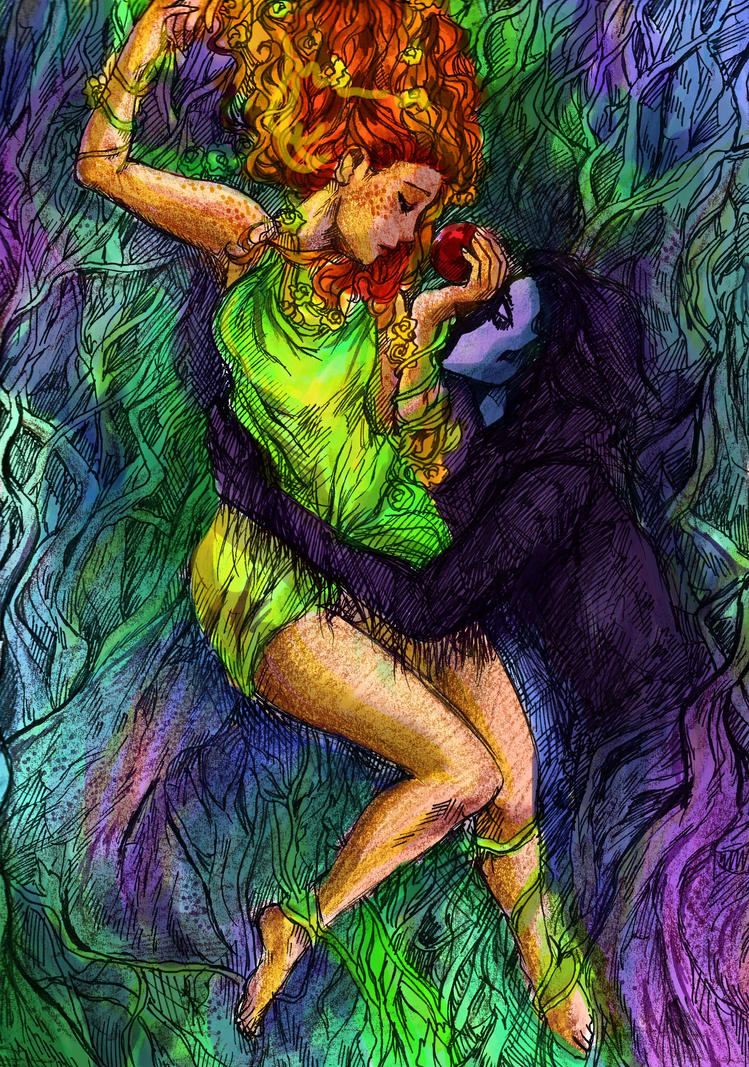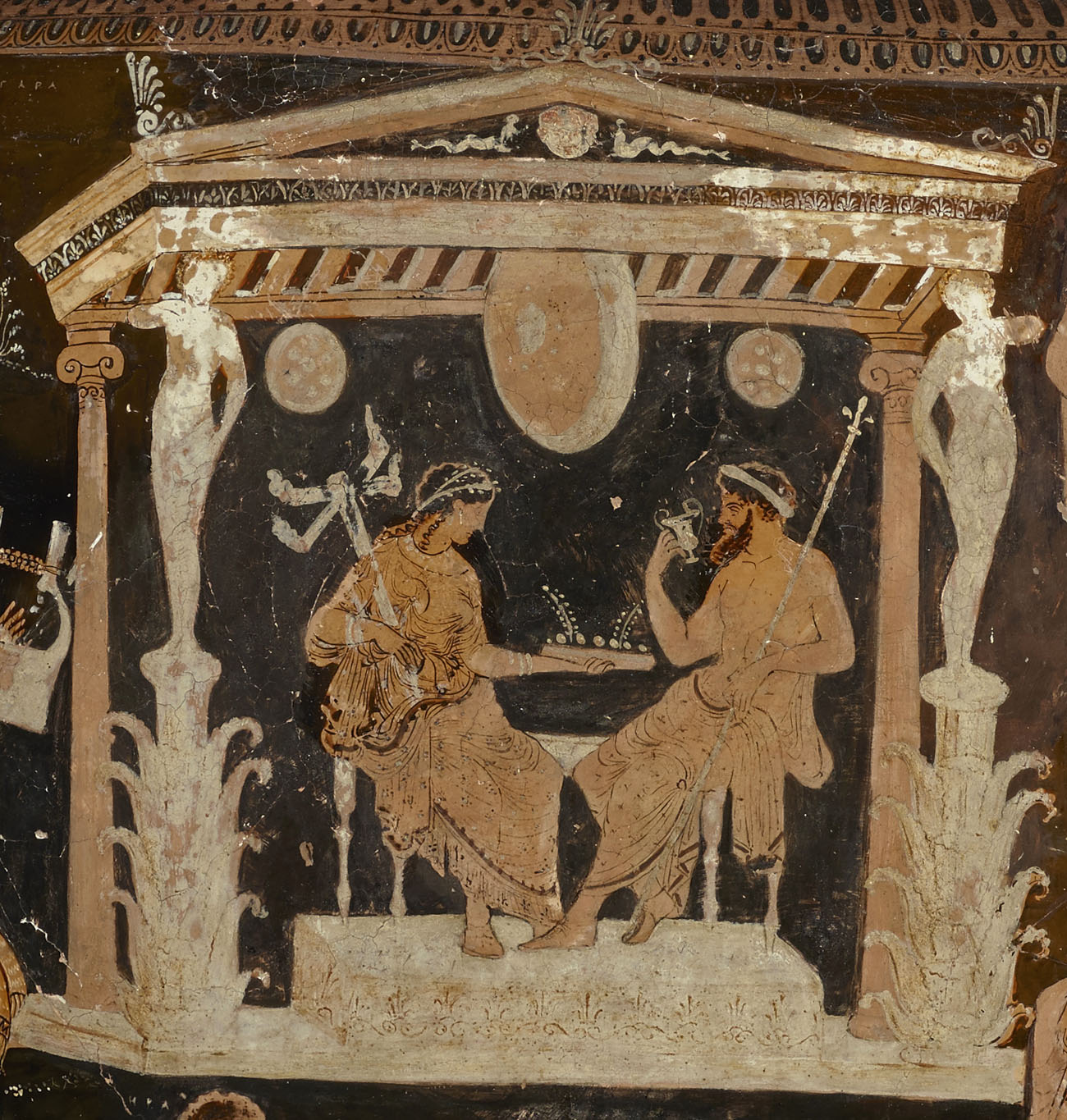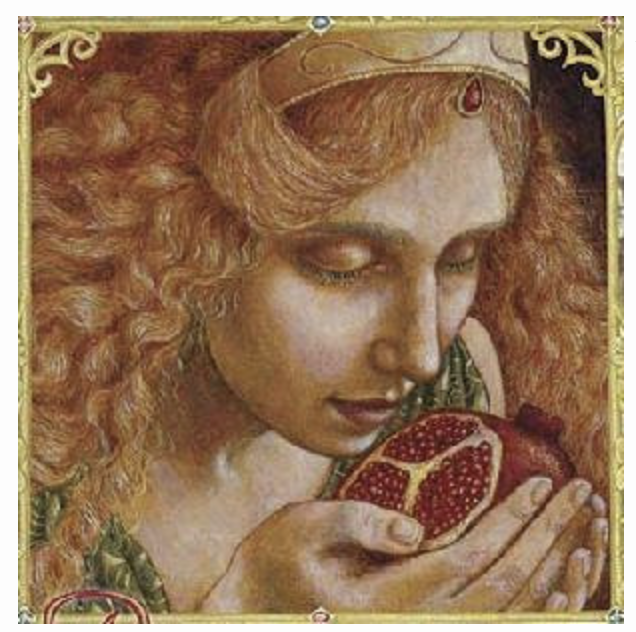
An Offering to Persephone — Ripe pomegranate with glistening beaded seeds, cradled by a frame of
Persephone and the pomegranate have been a popular subject in classical art for centuries. Ancient Greek pottery often depicted scenes from the Persephone myth, including her abduction by Hades and her consumption of the pomegranate seeds.

Greek Mythology Hades and Persephone Brave New World
Persephone, the daughter of Demeter and Zeus, was the wife of Hades and the Queen of the Underworld. She was a dual deity, since, in addition to presiding over the dead with intriguing autonomy, as the daughter of Demeter, she was also a goddess of fertility.The myth of her abduction by Hades was frequently used to explain the cycle of the seasons. . Together with her mother, she was the.

its hades and Persephone on pomegranate! had to photo shop this one! Greek Mythology Gods, Greek
There are many variations to this part of the myth but somehow, Hades got Persephone to eat a few pomegranate seeds. The pomegranate was the food of the Underworld and if its seed were consumed, they would change a person into loving the Underworld. The time came for Hades, Persephone, Zeus, and Demeter to meet.

Persephone & Hades (Illustration) World History Encyclopedia
The pomegranate is an important symbol in Persephone's mythology, and it is often associated with her. There are several reasons for this. The Role of Pomegranate in Persephone's Abduction As mentioned earlier, the pomegranate played a significant role in Persephone's abduction.

Persephone, goddess of spring, queen of the underworld. A colored version of a drawing from my
Museum's website. In the Ancient Greek world, the pomegranate was symbolic of funerary rituals, beliefs, and death. The mythological story of Persephone and Hades highlights its importance in the art of Ancient Greece. The Myth of Persephone Persephone is a goddess queen of the underworld and wife of the god Hades.

Hades, Persephone and the pomegranate fruit Classical mythology, 90s anime, Artist
Persephone had eaten some seeds from a pomegranate. So Hades demanded that she stay with him forever. Zeus decided that because Persephone had only eaten a tiny amount she could return to.

Hades and Persephone by Sorelliena on DeviantArt
Persephone or "the deceased woman" holding a pomegranate. Etruscan terracotta cinerary statue. National archaeological museum in Palermo, Italy

Ancient Vase Presents a Who’s Who of the Underworld Getty Iris
The Persephone and Hades myth: summary. Hades, the son of Cronos, was the brother of Zeus (king of the gods in Greek myth) and Poseidon (god of the sea). Hades rules over the underworld, or Hell. This came about because the three brothers divided up the world between them: Zeus took the heavens, Poseidon the sea, and Hades, the underworld.

A Pomegranate for Persephone Femmina Classica
But Hades had tricked Persephone into eating something—a handful of pomegranate seeds—while she was in the Underworld. Thus, although Persephone was allowed to spend part of the year on Olympus with her mother, she was forced to spend the other part of the year in the Underworld as Hades' bride.

"Persephone" by noisymouse Redbubble
Pomegranate trees have been cultivated since ancient times and were mentioned in Homer's Odyssey, where they grew on the island of Scheria or Phaeacia in the gardens of King Alcinous.. The most renowned myth associated with the pomegranate fruit is the one of the abduction of Persephone by Hades. According to the myth, Hades offered the.

Pom Pomegranate Art, Hades And Persephone, Tattoo Sketches, Underworld, Student Art, Artsy
The pomegranate holds a prominent position in the myth of Persephone and her forced marriage to Hades, the god of the Underworld. Hades abducted Persephone and took her to the Underworld to become his wife. Dimitra, Persephone's mother, and goddess of fertility mourned her lost daughter, causing all things on earth to cease growing.

nasnia “Despair with pomegranate taste by Natalia Drepina ” Persephone, Hades and persephone
Hades indeed complied with the request, but first gave her a kernel of a pomegranate to eat, whereby she became doomed to the lower world, and an agreement was made that Persephone should spend one third (later writers say one half) of every year in the underworld with Hades, and the remaining two thirds with the gods above. 13

Persephone Goddess of the Underworld ACEO ATC Mini Print Altar Etsy Goddess of the
The focus of the poem is one of the most renowned narratives from Greek mythology - the rape of Persephone by Hades, the god of the Underworld, and the response of Demeter to her loss. It is.

Pomegranate, by Persephone Greek mythology art, Persephone, Greek gods and goddesses
Persephone could have been released from Hades if she had not eaten anything in the Underworld during her captivity, but at the last moment, Hades gave her a pomegranate seed.

Persephone (The Pomegranate Seeds) Greek Mythology
Because Persephone had eaten a single pomegranate seed in the underworld, however, she could not be completely freed but had to remain one-third of the year with Hades, and spent the other two-thirds with her mother.

Stef Tastan Persephone art, Greek mythology art, Mythology art
When Persephone returns to her mother, the underworld is still on her. In one version of this mythic reunion, Yannis Ritsos writes: I heard you all calling my name; and my name was strange; and my friends were strange; strange the upper light with the square, pure white houses, the fleshy, multicolored fruits, pretentious and insolent . . .